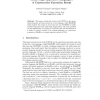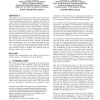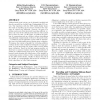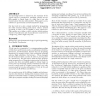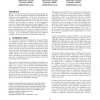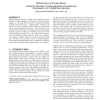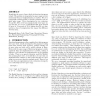103
click to vote
SAIG
2000
Springer
15 years 5 months ago
2000
Springer
Abstract. This paper extends the recent work [CMT00] on the operational semantics and type system for a core language, called MiniMLBN ref , which exploits the notion of closed typ...
133
click to vote
SAC
2000
ACM
15 years 5 months ago
2000
ACM
Abstract. Formal grammars are well established for specifying the syntax of programming languages. However, the formal specification of programming language semantics has proven mo...
PPDP
2000
Springer
15 years 5 months ago
2000
Springer
PPDP
2000
Springer
15 years 5 months ago
2000
Springer
PPDP
2000
Springer
15 years 5 months ago
2000
Springer
PPDP
2000
Springer
15 years 5 months ago
2000
Springer
Events play an important role in the construction of most software that involves interaction or simulation. Typically, programmers make use of a fixed set of low level events supp...
124
click to vote
PPDP
2000
Springer
15 years 5 months ago
2000
Springer
Erlang is a concurrent functional programming language designed to ease the development of large-scale distributed soft real-time control applications. It has so far been quite su...
108
click to vote
PPDP
2000
Springer
15 years 5 months ago
2000
Springer
We introduce and develop the notion of symmetric monoidal sketch. Every symmetric monoidal sketch generates a generic model. If the sketch is commutative and single-sorted, the gen...
PPDP
2000
Springer
15 years 5 months ago
2000
Springer
120
click to vote
PPDP
2000
Springer
15 years 5 months ago
2000
Springer
Identifying the source of space faults in functional programs is hard. The problem is compoundedas space usage can vary enormously from one implementation to another. We use a ter...
